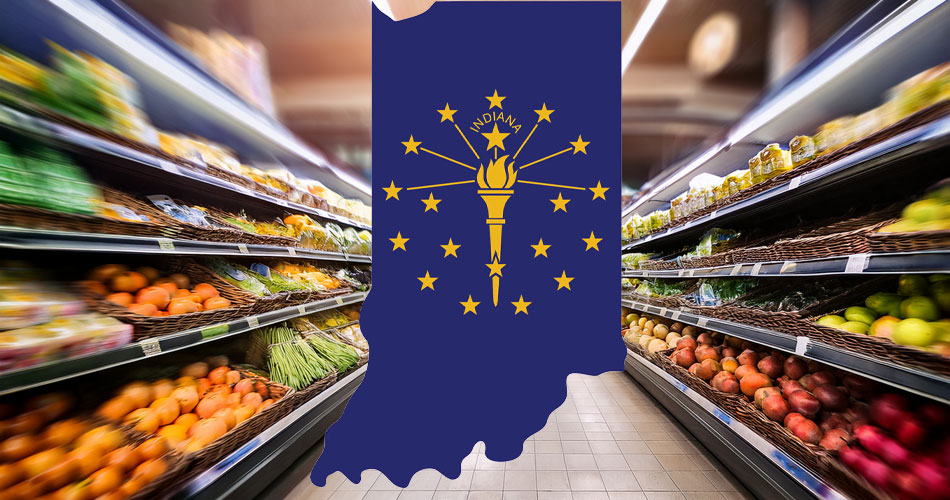Indiana’s economy remained largely stable through 2024, buoyed by strong capital investments and modest GDP growth. But a forecast released in April cast a shadow over the state’s two-year financial outlook, setting the stage for challenges in the grocery and convenience store industries.
According to the Indiana Business Research Center, the state’s GDP showed modest but consistent gains in 2024, with projected quarterly growth of 1 to 2 percent continuing into 2025.
Fueling optimism earlier in the year, the Indiana Economic Development Corporation reported a record-breaking $38.3 billion in committed capital investments through the third quarter of 2024, with advanced manufacturing, agriculture and logistics among the key beneficiaries.
But that optimism took a hit in mid-April when state lawmakers received a new fiscal forecast.
“The Indiana economy was very good up until about a month ago, when they got their two-year forecast,” said Joe Lackey, president of the Indiana Grocery & Convenience Store Association.
“The 16th of the month, they came out with their two-year forecast, and it showed them to have a $2 billion drop over the next two years … everything that had been done for the last three months went right out the window – the budget, everything fell apart.”
Impact on grocers: Tax hikes, SNAP cuts
The state responded quickly to the budget gap with a 200 percent increase in tobacco taxes, an attempt to shore up revenues that Lackey said will disproportionately affect small and independent retailers.
“It’s going to be devastating to the convenience stores and the independent grocers, anyone that has tobacco as any kind of a business,” Lackey said. “They’ll never achieve the amount of money they think they’re going to get … It was kind of a cop out.”

Lackey warned that the tax hike will drive consumers across state lines to purchase cheaper products, reducing in-state sales and shrinking the customer base for Indiana retailers.
“Indiana is the smallest state west of the Alleghenies, so we have a lot of that cross-border traffic that’s going to take our customers, which has a direct impact on store growth and sustainment of those stores when you start losing 10, 15, 20 percent of your gross because it’s going across the state line. Now you got a problem…”
Another point of tension: proposed changes to Supplemental Nutrition Assistance Program benefits. Indiana Gov. Eric Holcomb recently announced plans to restrict SNAP purchases of soft drinks and candy – mirroring policies in Arkansas.
U.S. Secretary of Health and Human Services Robert F. Kennedy Jr. and Mehmet Oz, administrator for the Centers for Medicare & Medicaid Services, recently visited the state and the governor to support the announcement. After industry pushback, implementation was delayed until January.
“We had a big meeting the next day to discuss it, and we said, it’s a little late guys, you went on TV and told the whole world this is what you’re going to do,” Lackey said. “At that point, they backed off until January ’26 as opposed to an immediate implementation that they had announced prior.
“But that is a big problem for the entire industry It’s going to be a problem for the whole country with regards to what they’re going to do with this. It is our understanding their intent is to take this nationwide.”
Complicating matters further is a proposal floated by the Trump adminstration to shift SNAP funding from the federal government to the states.
“My knee jerk reaction was no – not only no, but hell no,” Lackey said. “We can’t do that … We’ve already got budget issues and to come up with the funding for that program, I don’t know how in the world they’re going to fund it.”
He also reiterated his association’s strong ties with national advocacy groups such as the National Grocers Association, National Association of Convenience Stores and FMI – The Food Industry Association in resisting restrictive SNAP reforms. “Very, very close,” Lackey said. “All three of them are on board.”
Labor, legislation, logistics
The grocery industry in Indiana also continues to wrestle with a long-standing labor shortage.
“Labor is always an issue,” Lackey said. “In the old days, we used to be able to hire students … It’s almost impossible to do anymore with the federal regulations and rules. If you don’t have family members involved in independent stores, it becomes very difficult.”
Retailers face additional compliance hurdles with rules requiring staff selling tobacco or alcohol to carry a driver’s license – a rule that disqualifies some willing workers.
“We’ve got way too much government,” Lackey added. “Indiana is probably one of the better states … but it’s catching up with us.”
Chain activity, independent stability
Despite the turbulence, Indiana’s independent grocers have proven resilient.
“Our independent stores have been fairly stable,” Lackey said. “We lost a lot of them when the big box [retailers] came in … But those that have survived are very stable, and they’re good operations.”
Larger chains have entered the Indiana market in recent years – Hy-Vee and Houchens among them – often acquiring successful, family-run stores.
“They recognize that it’s successful, and they don’t want to mess with it. They acquire it because there may not be a family member there available to take it over,” he said.
“That’s what’s happened with a lot of our independents. Not very many of them closed in the sense of going bankrupt, but they sold and transitioned, and they’ve remained intact, to a large degree.”
Lackey expressed frustration with big box retailers, which he said have historically distanced themselves from the grocery identity. “They don’t take their responsibility with regard to being involved in food distribution issues.”
[RELATED: Houchens Food Group Acquires 3 Indiana Save A Lot Stores]
Supply chain, industry advocacy
Lackey emphasized the need for sustainable supply chains and reduced regulatory burden, particularly in light of inflation and ongoing logistical challenges.
“We need a lot less government and a lot less interference, so we have these sustainable supplies that we can not only supply our people with but can also continue to sell to foreign countries.”
As for the future, Lackey – who had planned to retire – says he’s staying on for another year.
“I don’t want to quit a loser,” he said. “This last session was a loss … try to get the legislature back on a solid footing.”

